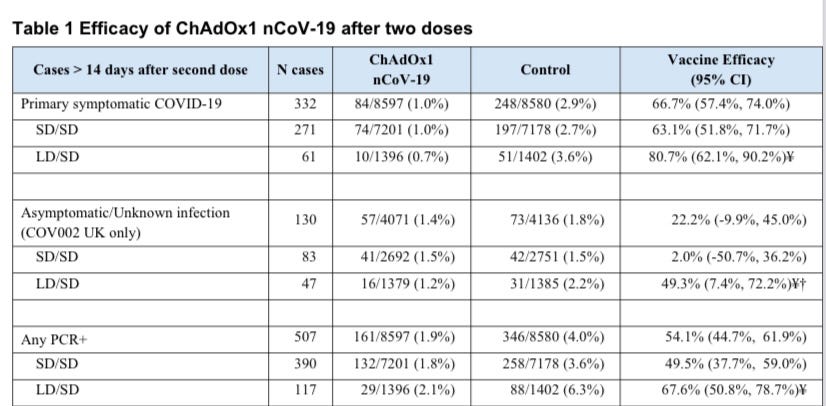Delayed second dose and (yes) transmission…
Disclaimer: This was the most challenging post I’ve ever written. Translating the complexity of the messy study design, statistical analyses, and implications was not easy and I recognize that I may lose a few of you. Just know that it was not intended. And, honestly, I was thinking about not posting this. But NYT came out with “breaking news” headlines this morning so I thought it was important to get out. Buckle up…
Yesterday, the Lancet (a highly respected journal) released a preprint from the AstraZeneca trial. The purpose of this study was to evaluate whether delaying the second dose had an impact on efficacy and antibodies. This was done post-hoc (so not intended, but since they had the data they ran the numbers). This paper also reported asymptomatic numbers, which can tell us impact of transmission after vaccination.
Delayed dose results:
-A delayed dose does not impact efficacy. In fact, it improves efficacy. Vaccine efficacy after a single dose of vaccine from day 22 to day 90 post vaccination was a combined 76% (59% efficacy at day 22 and 86% efficacy at day 90).
-Protection did not wane before a second dose. Antibody levels were maintained during this period with minimal waning by day 90 day
-The impact of a delayed dose on efficacy was no different among asymptomatic and symptomatic cases
-This study did confirm the importance of the second dose. We can NOT skip our second dose altogether. This boost is important.
Transmission results:
-There were 130 cases of asymptomatic infection.
-(remember important context: this trial had some people that got the doses that were intended (SD/SD) and some accidentally got a half dose first (LD/SD).)
-There was no difference in asymptomatic cases (and thus transmission) among the SD/SD people (41 cases in vaccine group and 42 cases in control group)
-There WAS a difference in asymptomatic cases (and thus transmission) among the LD/SD people (16 cases in vaccine group and 31 cases in control group)
Important considerations that I think are largely missed in mainstream media:
-Not all vaccines are the same. In fact, they are quite different. This is NOT evidence that we can delay Moderna or Pfizer doses
-There were key analyses NOT included in the paper, particularly age. In fact, it looks like they weren’t included in this delayed dose at all (see Figure). It’s not clear whether a delayed dose is generalizable to older adults (55+ years). This is incredibly important to know, as older folks have less neutralizing antibodies.
-It’s obvious that the two groups (those that received a delayed booster vs. those that did not have delayed booster) were VERY different in terms of age, sex, and occupation. We also know that those in the LD/SD group were VERY different in terms of age (younger) compared to those in the SD/SD group. We NEED to take this into account (which the study didn’t do) to imply causality. In other words, it’s not clear whether the increase in efficacy or decrease in transmission was actually from the delayed dose, the low dose, or because of demographics.
-This study did not report variants. And did not report whether delaying a second dose adds pressure on the virus to mutate even more
Bottom line: (And this is all my humble scientific opinion; take it or leave it) This data is messy. And it’s really hard to parse together the story in an accurate way. It looks like a delayed dose of AZ is “okay”. We aren’t necessarily surprised by this. But, I don’t think this study provides enough data to make sweeping policy changes (like delaying a second dose for the older population).
It also looks like we can remain hopeful that vaccines reduce transmission. But this wasn’t the “ah ha” transmission study I was waiting for. The data leads us to more questions than answers. We can’t really answer how transmission is reduced because this was not a transmission study. We simply do not have enough people in this study to be confident in the numbers.
So, it’s too early for me to call re: transmission. I know that NYT called it, but, as a scientist, I just cannot. Sorry guys, I’m just as disappointed as you. But, I AM still incredibly hopeful and you should be too. This is a reassuring sign that the pandemic will, in fact, end.
Love, YLE
PS: I hope other epidemiologists chime in! I had a brief discussion with other epi’s before posting this, but would love to hear other opinions too!
Data Source:
https://poseidon01.ssrn.com/delivery.php?ID=908065002113091029031029004116028092034057081068083017073097002123008109020031031080121005029070024024123121020000093004092067107017108057080016040016089012029024061015090120064080002082029044015123030087062015030073022110003024024070082086119004018090106117113094098107072092070005094074082&EXT=pdf&INDEX=TRUE





